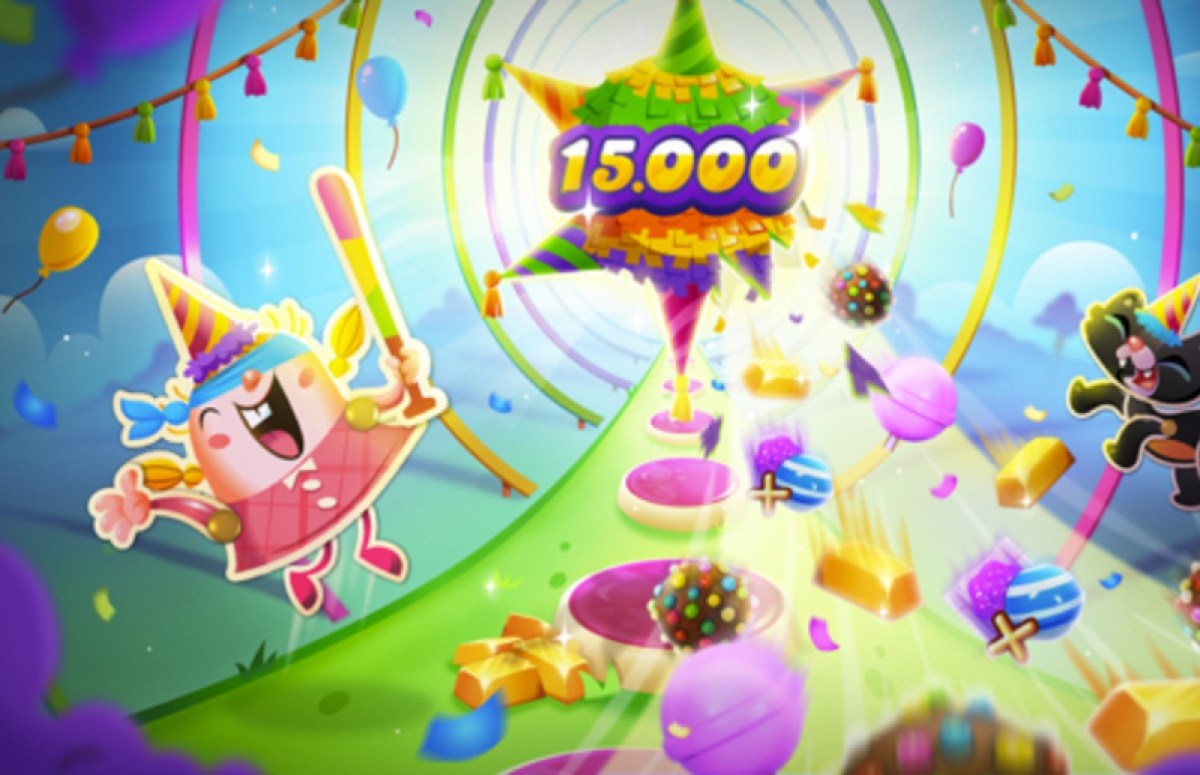A duo of King product and research directors spoke at the Game Developers Conference today about how AI transformed automated level creation in Candy Crush Saga.
King has had an interesting journey in implementing and using AI to create business value; it has investing in everything from A/B testing to high-speed AI level testing to enhance the player experience.
Back in September, Activision Blizzard’s King (now owned by Microsoft) said that Candy Crush Saga had reached $20 billion in revenue and five billion downloads to date since its debut in 2012 on mobile. That is the equivalent of a wrecking ball swinging through the video game industry. King had only 2,000 levels for the game back in 2016.
Sahar Asadi has been director of AI Labs at King for the past five years, heading a team that works on applied research. They have explored how to bring value to business by exploring more long term strategic initiatives and doing applied research, working very closely with central tech organizations but also very closely with game creators, she said in an interview with GamesBeat.
GB Event
GamesBeat Summit Call for Speakers
We’re thrilled to open our call for speakers to our flagship event, GamesBeat Summit 2024 hosted in Los Angeles, where we will explore the theme of “Resilience and Adaption”.
As a director of AI Labs, she is responsible for defining an AI research roadmap; developing and integrating AI use cases that could eventually create multiple effects for the business. Asadi has a real interest in showing up at and cofounding industry conferences.
Before joining King, Sahar held a number of important roles including a Data Scientist for Spotify, Research Scientist on natural language processing and information retrieval at Meltwater and working within two start-ups as senior machine learning engineer in Clusterone, building a platform for distributed deep learning and working on mobile product recognition.

And one of the core project areas that Asadi started with when she joined King has been around gameplay testing and level management and automation using AI.This is important work, considering King has maintained so much user interest in King for more than a decade.
“The majority of our players’ time is actually spent playing levels and to give a very good play experience is fundamental,” she said. “We started looking at creating playtesting bots for validating the quality and understanding the quality of the levels prior to the release and also then building tools on top of that in order to refine the levels. This has been a very close collaboration with games.”
Asadi gave the talk along with Anna Hernandelius, product director of Candy Crush Saga. Their goal was to explain the iterative process where designers can spend less time on mundane tasks and more time creating levels.
“This is particularly important for two reasons. One is because levels are a core art of the player experience. The second is this game that we have in Candy Crush Saga alone has more than 15,000 levels, and the volume of the levels is growing,” Asaid said. “This scale is important to maintain the quality, but also be able to generally create more and more levels and live up to the standard, or the quality that we have had so far.”
“We will talk about how AI has played this transformative role in making that growth happen,” Asadi said.
AI can test whether a level is enjoyable or not, or if it is too frustrating or difficult, and a general idea of its quality level. It allows the designers to iterate faster and spend more time on the creative tasks, Asadi said. The AI brings in the quality in a shorter time, with a human in the loop. The goal is to reduce the “shuffle experience” where the player has to essentially start over.
Researchers sare looking at how much generative AI can do as an assistive tool for designers to use to focus on improving the gameplay experience and making designers more productive. The goal of AI is to eliminate the tedious work in every job and to free the humans to be creative, she said.

Asadi is amazed at how fast gamers are able to speed through the newly created levels and stay on top of the Candy Crush Saga expansions as fast as they come out.
“We have a lot of players at the end of our progression and they get really excited to get the new levels and finish them fast,” she said.
The focus is of the research is on the intersection of AI and business.
“For me, personally, I’ve worked in a lot of different companies. And my motto has been to crack this challenge of taking research to product, which is a difficult thing if you’re just looking to use existing solutions and small take small steps,” she said. “It’s much easier than [doing] strategic, visionary solutions and taking them into into products. And so we talk about how we have cracked that, how do we do continuous innovation? How did we manage to have adoption, how we worked together and what, led to this state? So that’s part of the conversation.”
She is very interested in seeing the future of AI evolve, not just for Candy Crush Saga but for all things that can be one in gaming and in playtesting.
As for the progress with AI so far and how much there is to come, Asadi said, “It’s a very exciting moment, that AI is accelerating and the innovation has big momentum in the world. And that unlocks a lot of new opportunities,” she said. “There is good appetite in society [for AI] and all companies want to explore and try out AI. There’s also good technologies in place that allow for further innovations. So I think it’s time to innovate and come up with solutions.”
That means King is cracking more complex problems when it comes to research.
“The core of [the research] is making sure that we build this fun game experience for the players. And also making sure that we allow our designers to have the space to work on the creative part and less on mundane parts,” Asadi said. “And that makes me excited. We are really bringing value in both aspects for both our developers and designers and our players. I want to underscore the fact that to make this happen in an organization — get adopted and really used in production — It’s a huge cross-collaboration effort.”

I noted there are outside services King can tap now for AI services. Asadi said the company has grown its in-house capabilities over time and it explores the external tools. But a lot of tools need to be application specific, Asadi said.
“We publish a lot on the research we do. And we also like to look at the problems that we need to solve internally, building AI solutions in-house,” she said. “We don’t go into technical machine learning details of what we build. We work on reinforcement learning. And we look at AlphaGo, like everyone was talking about, which is about getting the best-performing agents that can beat the best human player. We want to have a playtesting agent that plays human-like, because we want to measure whether the gameplay experience that we are building is good for the player.”
And King has diverse types of players with different skill sets and styles and prferences. And it studies how to incorporate all of that into its solutions.

